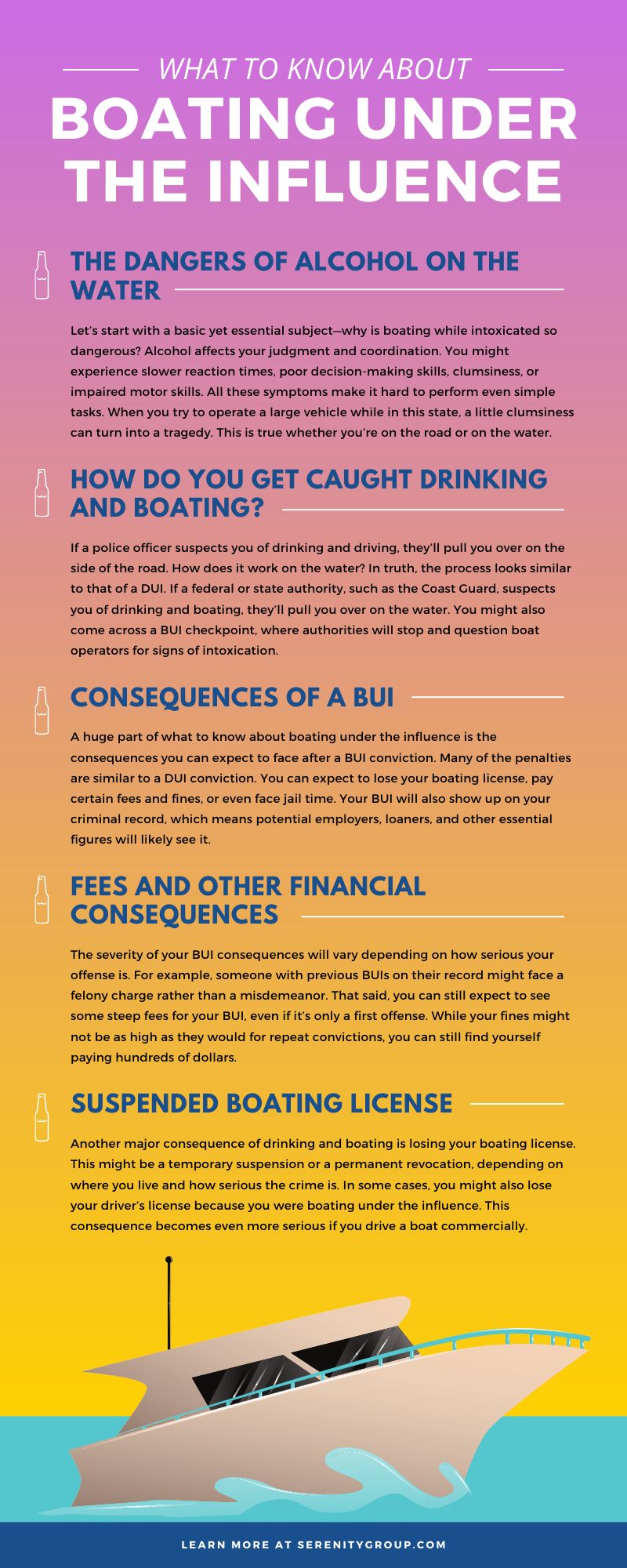What To Know About Boating Under the Influence

Everyone knows that driving a car while under the influence of drugs or alcohol can lead to serious consequences, but did you know that the same can happen when you’re behind the wheel of a boat? Every single state has laws against boating while intoxicated, as does the federal government. These laws apply to any kind of watercraft, from small, personal boats to massive yachts. If you’re operating a vehicle on the water, you need to be sober. Just like with a DUI, boating under the influence of drugs or alcohol can land you in serious trouble. From fees to jail time, the consequences of a BUI are severe. On top of that, boating while intoxicated puts yourself, your passengers, and everyone else on the water in danger. Learn how to avoid these troubles with this rundown of what to know about boating under the influence.
The Dangers of Alcohol on the Water
Let’s start with a basic yet essential subject—why is boating while intoxicated so dangerous? Alcohol affects your judgment and coordination. You might experience slower reaction times, poor decision-making skills, clumsiness, or impaired motor skills. All these symptoms make it hard to perform even simple tasks. When you try to operate a large vehicle while in this state, a little clumsiness can turn into a tragedy. This is true whether you’re on the road or on the water. Furthermore, alcohol can affect you quicker when you’re out having fun in the sun. If it’s warm outside, the heat can cause you to become dehydrated faster, which means alcohol will hit you harder. Boater’s fatigue—which is caused by environmental stressors like sunlight, wind, and the rocking motions of the boat—can also make intoxication worse. All of this makes it easy for boaters to underestimate how intoxicated they are, leading to accidents on the water.
Another factor is that boaters almost always have less experience behind the wheel of a boat than the wheel of a car. Even if you hit the water regularly, driving a boat isn’t a daily occurrence. With less experience operating the craft, it’s much easier to make mistakes or lose control of the boat.
How Do You Get Caught Drinking and Boating?
If a police officer suspects you of drinking and driving, they’ll pull you over on the side of the road. How does it work on the water? In truth, the process looks similar to that of a DUI. If a federal or state authority, such as the Coast Guard, suspects you of drinking and boating, they’ll pull you over on the water. You might also come across a BUI checkpoint, where authorities will stop and question boat operators for signs of intoxication. If law enforcement determines that you are intoxicated, they will likely end your voyage by towing your boat to shore or asking a non-intoxicated passenger to drive to shore. From there, officers might arrest or detain you until you’re sober. If you’re arrested by federal authorities on waters that are subject to U.S. jurisdiction, they might hand you over to local or state authorities instead.
Consequences of a BUI
A huge part of what to know about boating under the influence is the consequences you can expect to face after a BUI conviction. Many of the penalties are similar to a DUI conviction. You can expect to lose your boating license, pay certain fees and fines, or even face jail time. Your BUI will also show up on your criminal record, which means potential employers, loaners, and other essential figures will likely see it. As steep as your consequences might be, though, they aren’t the end of the world. The more you know about your conviction, the easier it will be to prepare for your potential consequences and take responsibility for your actions.
Fees and Other Financial Consequences
The severity of your BUI consequences will vary depending on how serious your offense is. For example, someone with previous BUIs on their record might face a felony charge rather than a misdemeanor. That said, you can still expect to see some steep fees for your BUI, even if it’s only a first offense. While your fines might not be as high as they would for repeat convictions, you can still find yourself paying hundreds of dollars. On top of that, you might have to pay for court fees or property damage. Finally, your insurance premium can go up due to a BUI. Some boating insurers might drop you altogether for having a BUI conviction on your record. Others will raise the cost of your premium because they now classify you as a high-risk driver.
Suspended Boating License
Another major consequence of drinking and boating is losing your boating license. This might be a temporary suspension or a permanent revocation, depending on where you live and how serious the crime is. In some cases, you might also lose your driver’s license because you were boating under the influence. This consequence becomes even more serious if you drive a boat commercially. For many employers, a BUI is an automatic reason to fire someone. Having a BUI on your record can also make it extremely difficult to get another commercial boating job.
Criminal Charges
As mentioned above, the consequences of your BUI will become more severe if it’s a repeat offense or if other factors make the crime more serious. For example, many states have additional BUI laws relating to minors. If there are minors on board the watercraft while you’re driving under the influence, you will likely face steeper consequences. The same is true if authorities find you’ve given drugs or alcohol to minors during the trip. Furthermore, your BUI misdemeanor might become a gross misdemeanor or even a felony if you have a BAC of .16 or higher, you refuse to submit to chemical testing, or if you have a previous BUI or DUI on your record.
If you find yourself facing these or other consequences after a BUI conviction, remember that you’re not alone. Serenity Group is ready to help you navigate insurance policies so that you can focus on meeting your other requirements. Visit our website to learn about SR22 insurance laws in your state. We can also help you compare SR22 insurance quotes in California, Florida, or anywhere else you live and boat.


Recent Comments